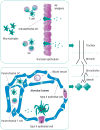Respiratory Homeostasis and Exploitation of the Immune System for Lung Cancer Vaccines
- PMID: 22368692
- PMCID: PMC3285551
- DOI: 10.17925/ohr.2009.05.1.40
Respiratory Homeostasis and Exploitation of the Immune System for Lung Cancer Vaccines
Abstract
Lung cancer is the leading cause of all cancer deaths in the US. The international scientific and clinical community has made significant advances toward understanding specific molecular mechanisms underlying lung carcinogenesis; however, despite these insights and advances in surgery and chemoradiotherapy, the prognosis for non-small-cell lung cancer (NSCLC) remains poor. Nonetheless, significant effort is being focused on advancing translational research evaluating the efficacy of novel targeted therapeutic strategies for lung cancer. Illustrative examples of this include antagonists of the epidermal growth factor receptor (EGFR), tyrosine kinase inhibitors (TKIs) such as gefitinib and erlotinib, and a diverse assortment of anti-angiogenic compounds targeting growth factors and/or their receptors that regulate tumor-associated angiogenic programs. In addition, with the increased awareness of the significant role chronically activated leukocytes play as potentiators of solid-tumor development, the role of innate and adaptive immune cells as regulators of lung carcinogenesis is being examined. While some of these studies are examining how novel therapeutic strategies may enhance the efficacy of lung cancer vaccines, others are evaluating the intrinsic characteristics of the immune response to lung cancer in order to identify rate-limiting molecular and/or cellular programs to target with novel anticancer therapeutics. In this article, we explore important aspects of the immune system and its role in regulating normal respiratory homeostasis compared with the immune response accompanying development of lung cancer. These hallmarks are then discussed in the context of recent efforts to develop lung cancer vaccines, where we have highlighted important concepts that must be taken into consideration for future development of novel therapeutic strategies and clinical trials assessing their efficacy.
Figures


Similar articles
-
Epidermal Growth Factor Receptor Mutation (EGFR) Testing for Prediction of Response to EGFR-Targeting Tyrosine Kinase Inhibitor (TKI) Drugs in Patients with Advanced Non-Small-Cell Lung Cancer: An Evidence-Based Analysis.Ont Health Technol Assess Ser. 2010;10(24):1-48. Epub 2010 Dec 1. Ont Health Technol Assess Ser. 2010. PMID: 23074402 Free PMC article.
-
Afatinib as First-Line Treatment in Asian Patients with EGFR Mutation-Positive NSCLC: A Narrative Review of Real-World Evidence.Adv Ther. 2021 May;38(5):2038-2053. doi: 10.1007/s12325-021-01696-9. Epub 2021 Mar 17. Adv Ther. 2021. PMID: 33730350 Free PMC article. Review.
-
Targeting the epidermal growth factor receptor in non-small cell lung cancer cells: the effect of combining RNA interference with tyrosine kinase inhibitors or cetuximab.BMC Med. 2012 Mar 21;10:28. doi: 10.1186/1741-7015-10-28. BMC Med. 2012. PMID: 22436374 Free PMC article.
-
Hepatotoxicity with epidermal growth factor receptor tyrosine kinase inhibitors in non-small-cell lung cancer patients: A network meta-analysis.J Clin Pharm Ther. 2021 Apr;46(2):310-318. doi: 10.1111/jcpt.13281. Epub 2020 Oct 8. J Clin Pharm Ther. 2021. PMID: 33031574 Review.
-
Meta-analysis of Targeted Therapies in EGFR-mutated Non-Small Cell Lung Cancer: Efficacy and Safety of Osimertinib, Erlotinib, and Gefitinib as First-line Treatment.Am J Clin Oncol. 2025 Jan 1;48(1):44-54. doi: 10.1097/COC.0000000000001138. Epub 2024 Sep 11. Am J Clin Oncol. 2025. PMID: 39257317
References
Grants and funding
LinkOut - more resources
Full Text Sources
Research Materials
Miscellaneous
